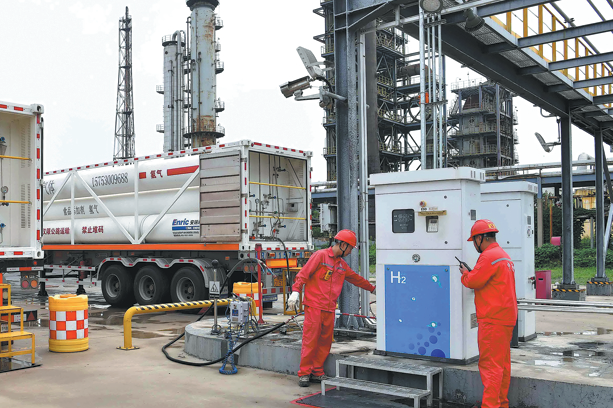Bayer upbeat on innovative growth opportunities and Chinese market

German life sciences company Bayer has embraced a "strong start of its pharmaceuticals business into 2024", with its innovation expertise playing a vital role in fueling growth, according to the head of its pharmaceuticals division.
Data from the company's quarterly financial report show that its sales of prescription medicines increased by 3.9 percent to nearly 4.36 billion euros ($4.72 billion) during the first quarter.
Stefan Oelrich, president of Bayer Pharma and member of the management board at Bayer, attributed the upswing, which "exceeds expectations", to the company's increased product pipeline value and enhanced research and development.
"We have made significant progress in growing our pipeline value, clearly demonstrating that our revised R&D strategy is bearing fruit," he said. "I've never seen this type of quality come through the early pipeline that will in the next five years translate into a very competitive late-stage pipeline.

"At the same time, we are further expanding our presence in key therapeutic areas, making important advancements in realizing the full potential of our current launch assets. Specifically, we have strengthened our innovation engine with a clear research focus on four core therapeutic areas: cardiovascular diseases, oncology, immunology, and neurology and rare diseases; extended capabilities through collaborations and acquisitions of platform companies, and increased the quality of our portfolio through rigorous portfolio pruning.
"As a result, we advanced eight Investigational New Drug applications last year and four products are expected to transition to Phase II by the end of this year, all with first-in-class potential."
Oelrich underlined that Bayer's growth strategy is built on three key pillars: renewing top line, reallocating resources and rebuilding its pipeline.
Long-standing presence
As one of the oldest multinational companies and one of the best-known multinational brands in China when it comes to health, Bayer has been present in the country for more than 140 years.
"With its tremendous market potential and vibrant innovation ecosystem, China is and will remain one of Bayer's most important markets and business priorities in the future," Oelrich said. "We are very focused on expanding our leadership and presence in China, which includes in Bayer's traditional areas of strength; cardiovascular, oncology, women's health and ophthalmology.
He cited women's healthcare, which remains a core part of Bayer's business, as an example. "We are investing in broadening therapeutic options and raising the standard of care for menopausal women."
"This is exactly within our expertise so we continue to innovate in that sphere," he said.
To date, Bayer has established two global R&D centers, one of which is focused on prescription medicines and located in Beijing, as well as six manufacturing facilities in China, the company's second-largest market worldwide.
In the past five years, Bayer saw around 30 of its new drugs and indications gain the green light to marketing authorization in China, according to the company.
"We continue to bring innovative products to China to meet the needs of Chinese patients," Oelrich said.
In 2022, Bayer launched three new drugs in the country, almost simultaneously with European countries and the United States.
"China in the past used to lag behind (in new drug launches) but this has really changed and it's a clear testimony to the support of the Chinese government for innovation," Oelrich said. "And that's something that as an innovator, we very much welcome."
Unabated support
All three of the new products developed by Bayer were included in China's National Reimbursement Drug List during the past two years at affordable prices.
"We are fully supportive of the Chinese government's efforts in making healthcare products accessible to Chinese patients," Oelrich said.
With the aging population and changes in lifestyle, the incidence of major chronic diseases such as cardiovascular and cerebrovascular diseases and cancer has generally been on the rise in recent years. Deaths from chronic diseases account for more than 80 percent of total fatalities among the population, Guo Yanhong, head of the National Health Commission's department of medical emergency response, said at a news conference in November.
The Central Committee of the Communist Party of China and the State Council addressed the issue back in 2016 when they issued Healthy China 2030. This, coupled with the nationwide healthcare system reforms that followed, presented an opportunity for multinational pharmaceutical companies, including Bayer, to ramp up their investments in China. It has significantly spurred growth in technological innovation and production capabilities within the country.
To meet growing demand from the Chinese market, Bayer has invested some 100 million euros to scale up supply from its Beijing supply center in recent years, Chinese media reported. "We're very much supporting the Chinese government's effort in its Healthy China 2030 initiative and we've seen how that has converted into much stronger openness to innovation," Oelrich said.
Friendly environment
The senior executive highly values China's innovation-friendly climate. "We appreciate China's strong encouragement of innovation," Oelrich said. "Innovation is sort of like the lifeblood of everything we do, which is why there's so much focus for us in reviewing innovation.
"Innovation ultimately benefits patients. Encouraging innovation and benefiting patients are also Bayer's founding principles. We are also integrating into the local innovation ecosystem through collaboration."
Bayer has been enhancing research cooperation with its partners in China, including local academia such as Peking and Tsinghua universities, and local companies, to develop and market potential treatments.
During the sixth China International Import Expo in Shanghai in 2023, Bayer signed more than 10 agreements with big names in the Chinese market. They included Biopharma Evolution, a subsidiary of Shanghai Pharmaceuticals, and Alibaba's cloud computing subsidiary Aliyun.
The move enables Bayer to explore more collaborations on R&D and business models with local partners, share enormous opportunities in the Chinese market and offer better and faster solutions to Chinese customers, local media reported.
"We also support the Chinese government's efforts to optimize the business environment by implementing a series of favorable policies and improving laws and regulations, resulting in China becoming one of the world's most dynamic markets," Oelrich said.
One of the most important indicators for measuring the business environment is intellectual property protection. With China's support of a good IP system, foreign companies will continue to expand their investment in the Chinese market, he said.
"China is now one of the premier producers of new patterns in life sciences in the world, which is really a testament to the strength of innovation that's coming out of China. I believe that multinational companies like us cannot afford not to be cooperating in China," he noted.
Strong partner
Oelrich continued: "We see China as a strong partner, a strong market, and a key innovator in the future.
"By advancing our cell and gene therapy pipeline, we are moving beyond symptomatic treatments, which we hope will lead to treatments that can better alleviate disease burden and in some cases, stop or even reverse diseases. We are fully committed to leading cell and gene therapies, and we are taking all the necessary steps in that direction."
"We are shaping a new era of medicine, confident in our ability to transform patient care with our high-value launch brands and portfolio of established products," he said. "The reinvention of our R&D setup results in an innovation pipeline with productivity unprecedented at Bayer."

Today's Top News
- CIIE a platform for cooperation and innovation-driven growth: China Daily editorial
- 'Microphone diplomacy' should be shunned: China Daily editorial
- China urges Netherlands to responsibly resolve Nexperia issue
- Shenzhou XX crew to return to Earth on Nov 5
- Xi urges enhanced cooperation, better synergy of development strategies with Russia
- Xi extends condolences over deadly Jamaica hurricane






























